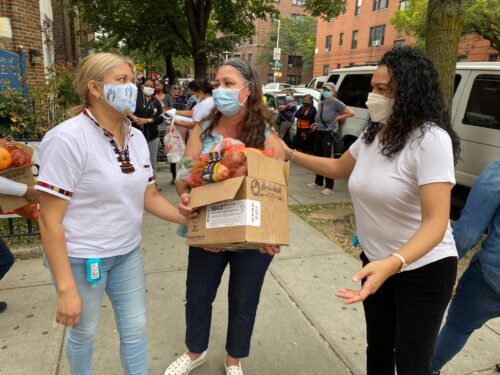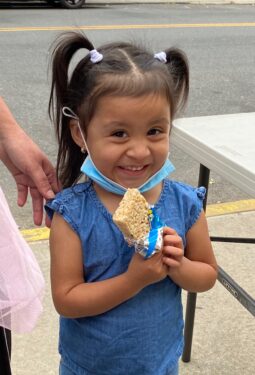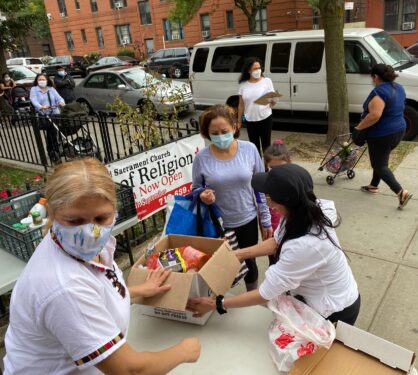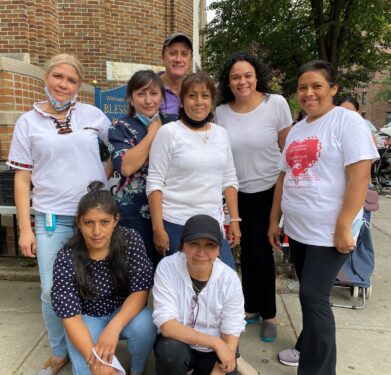
JACKSON HEIGHTS — The facemask covered Maria Guadron’s smile, but not her tears.
The mother of three young daughters wept out of joy and gratitude for gifts of fresh vegetables and milk. She received them Thursday, Sept. 24, at a weekly food drive supported by her parish, Blessed Sacrament Church, in Jackson Heights, Queens.
“I thank God for sending people so attentive to our needs,” she said. “God is within every person who has helped us.”
Guadron and her husband lost their jobs at the start of the pandemic; with a baby on the way, food was scarce. To help people like them, an informal prayer group of Blessed Sacrament parishioners started to deliver a few groceries.
But this ministry has flourished into a parish-supported effort, now serving as many as 300 families each week, most of whom lined up outside the church on 35th Avenue to accept food boxes. Guadron came with her youngest daughters, Lucia, 3, and Karina, 4 months. She also has an 11-year-old daughter, Angie.
Stacks of canned goods, plus cartons and mesh bags of just-delivered produce filled the foyer. Volunteers scurried about, retrieving the food and assembling various goods in boxes for the people outside.
Volunteers never know what they’ll have to give each week — that depends on donations — but on this day, people also received fresh milk and Rice Krispies Treats.
“I am very grateful to the church,” Guadron said, “and I am very happy I belong to this parish.”

Angelica Taveras, a co-founder of the new food ministry, said Blessed Sacrament had a longtime food pantry, however, in recent years, the parish ran short on food donations and storage space, so the focus shifted to offering food vouchers and coupons.
Then the pandemic hit New York City. It ravaged Jackson Heights and other neighborhoods in Queens, which quickly became one of the worst-hit areas in the U.S.
According to the latest data from the New York City Health Department, as of Sept. 24, Jackson Heights had recorded 2,852 COVID-19 cases and confirmed 260 deaths. Next door is the much larger Corona neighborhood, where 5,158 people got the virus, and 447 died, the data showed.
Most recent data also showed Queens led the five boroughs in confirmed COVID-19 deaths: 6,019; followed by Brooklyn, 5,689; Bronx, 4,014; Manhattan, 2,530; and Staten Island, 902.
Parishes throughout the boroughs, including Blessed Sacrament, couldn’t open to the public — not even for Mass or funerals.
Taveras and other parishioners shifted to phone calls and text messages to check on each other and share prayer requests. That’s how she learned that her friends Gonzalo and Mayra Murillo had helped a few families with groceries early in the pandemic.
“When I noticed this,” Taveras recalled, “I said, ‘Why not get together, get some information from people, and deliver more food to more families?’ We identified families in need, affected specifically by the virus.”
Also, the organizers wanted to honor Blessed Sacrament’s original food bank’s legacy, which was operated by parishioners who also belonged to the St. Vincent DePaul Society, according to Taveras.
“We met together, we shared our ideas, and we made a plan,” she said.

The friends learned who needed food, donations followed, and groceries arrived at people’s front doors.
Taveras credited Mayra and Gonzalo Murillo for donations received from their extensive contacts throughout the area. She said Mayra is incredibly charming at corralling donations.
“Every little thing people had extra, they donated that — fruit, vegetables,” Taveras said. “We collected canned food. Other people donated money. The beautiful thing is that even though people struggled themselves, they gave from the little that they had.”
As the pandemic spread, nonessential businesses shuttered, canceling paychecks. Other families lost incomes from loved ones, either hospitalized or taken by the virus. The list of needy families grew. By mid-April, the friends were helping about 200 families each week.
Taveras said Father Gabriel Toro, Blessed Sacrament’s pastor, offered resources like the parish’s Facebook page to showcase the food ministry’s work. Donations accelerated.
One of the largest deliveries made was 17 passenger vans filled with gallon jugs of milk, Taveras said. Two donors with access to fresh produce made huge donations when they could.
“That’s when we knew we had to restructure this,” Taveras said.
Now, instead of delivering the food, the group distributes it in the church. That way, the fresh produce is given immediately; which is important as the parish isn’t set up to store mass quantities of food.
Extra donations promptly go to other food banks.
At the Sept. 24 event, Gloria Montoya received fresh potatoes, celery, tomatoes, and canned fruit. She planned to make a salad and mashed potatoes, and the celery would be squeezed into juice, a nutritious beverage for her elderly mother who has diabetes.
Caring for her mother, who also has high blood pressure and dementia, got more demanding when the pandemic eliminated Montoya’s job. Meanwhile, her sister in New Jersey had the virus, but safety restrictions kept Montoya in Jackson Heights.
“It was very sad not being able to help her,” Montoya said. “Not being with her was devastating.”
Instead, Montoya focused on helping neighbors and caring for her mother. She and her mother never got the coronavirus, and her sister recovered.

The food donations, she said, helped “tremendously.” “God always provides,” she said.
Father Cesar Peña, a parish vicar, greeted people at the Sept. 24 event. He recalled his first day at Blessed Sacrament was Jan. 31. Weeks later, the pandemic spread through Queens, forcing the church to become a “virtual parish” with online Masses.
“I had never seen anything like this,” said Father Peña, a native of Colombia. “It was sad, even scary, actually.”
By late summer, in-person Masses had resumed but with strict social distancing and mandatory face coverings. Parishioners who lost loved ones to COVID-19 could finally bring their ashes to the church for funeral Mass, Father Peña said.
He noted that the pandemic did create new things that grew “virally” for the better. Blessed Sacrament’s online Masses are now viewed worldwide, according to software programs that track viewership.
Father Peña added that the new food ministry has great potential.
“I would say the Church is responding in every way she can,” the vicar remarked. “These volunteers are great. And we want to keep doing this even after the pandemic.
“And all are welcome. You don’t even have to be Catholic. The church is always open to everyone.”
